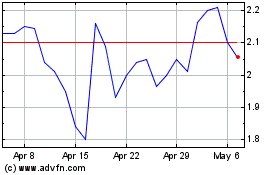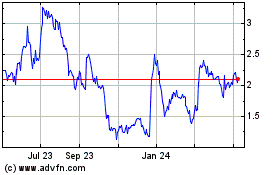New Clinical Studies Support Broader Use of CardioNet System for the Detection of Atrial Fibrillation
January 08 2009 - 4:05PM
Business Wire
CardioNet, Inc. (NASDAQ:BEAT), a leading wireless medical
technology company with an initial focus on the diagnosis and
monitoring of cardiac arrhythmias, today announced the publication
of two studies and the presentation of two abstracts that further
support the broader use of the CardioNet System for the detection
of atrial fibrillation (AF). The studies demonstrate the CardioNet
System�s ability to detect clinically significant AF events in
patients following ischemic stroke or surgical AF ablation
procedures. Arie Cohen, President and CEO, commented: �The
clinically proven effectiveness of the CardioNet System provides
physicians the opportunity to detect any patients that relapse with
AF events, both symptomatic and asymptomatic, therefore enabling
the physician to prescribe additional treatment or drug therapy in
cases where the AF has reoccurred. We believe these studies,
combined with the recent launch of our enhanced AF reporting
package, will drive further adoption of our system by physicians
for the evaluation of catheter and surgical ablation procedures and
by physicians evaluating the presence of AF in stroke patients.�
The first study is titled �Atrial Fibrillation Detected by Mobile
Cardiac Outpatient Telemetry in Cryptogenic TIA or Stroke,�
authored by A.H. Tayal, M.D., Allegheny General Hospital,
Comprehensive Stroke Center and published in the November 18, 2008
issue of Neurology. The purpose of the study was to demonstrate the
feasibility of detecting AF in patients with stroke of undetermined
etiology through prolonged monitoring. The study concluded that the
CardioNet System detected a high rate of AF (23%) in patients that
have experienced a transient ischemic attack (TIA) or stroke for
which the etiology was indeterminable through standard diagnostic
evaluation methods. Dr. Tayal, senior author of the study,
commented: �Our study showed that mobile cardiac outpatient
telemetry had a high rate of AF detection, including asymptomatic
and short events, which may be a biomarker of prolonged and
clinically significant AF. Such patients may benefit from
anticoagulation and may not have been diagnosed with AF through
standard methods.� Evelio Rodriguez, M.D., Division of
Cardiothoracic and Vascular Surgery, Brody School of Medicine, East
Carolina University, presented an abstract from a study titled
�Cryo-Maze for Concomitant Atrial Fibrillation: Mid-Term Results
using CardioNet Home Monitoring Testing� at the 46th Annual Meeting
of the Pennsylvania Association of Thoracic Surgeons on October 3,
2008. The study utilized the CardioNet System for home monitoring
of patients that underwent concomitant AF ablation to determine the
efficacy of the procedure. The authors of the study noted that
rhythm assessment after ablation with electrocardiogram (ECG)
and/or Holter monitors has been shown to overestimate success,
which led to their selection of the CardioNet System for the study.
The study concluded that home monitoring with the CardioNet System
should become standard of care after interventions performed to
restore sinus rhythm in patients with AF. Two additional studies
utilized the CardioNet System for post-operative management and
follow-up of patients that underwent surgical procedures to treat
AF: �Toward a Definitive, Totally Thoracoscopic Procedure for
Atrial Fibrillation� � authored by John Sirak, M.D., Ohio State
University Department of Surgery, Division of Cardiothoracic
Surgery, Columbus, Ohio and published in the December 8, 2008 issue
of The Annals of Thoracic Surgery. �Surgical Correction Of Atrial
Fibrillation With The Cryomaze Procedure: Long-term Outcomes
Assessed With Continuous Outpatient Telemetry� � abstract presented
by James Gammie, M.D., University of Maryland Medical Center, at
the Southern Thoracic Surgical Association 55th Annual Meeting on
November 6, 2008. To date there have been 19 published clinical
papers and abstracts on the capabilities and efficacy of the
CardioNet System. This includes the landmark study that
demonstrated the CardioNet System to be nearly 3X superior in
diagnosing clinically significant arrhythmias as compared to loop
event monitoring. About CardioNet, Inc. CardioNet is the leading
provider of ambulatory, continuous, real-time outpatient management
solutions for monitoring relevant and timely clinical information
regarding an individual's health. CardioNet's initial efforts are
focused on the diagnosis and monitoring of cardiac arrhythmias, or
heart rhythm disorders, with a solution that it markets as the
CardioNet System. More information can be found at
http://www.cardionet.com. Forward Looking Statements This press
release includes certain forward-looking statements within the
meaning of the "Safe Harbor" provisions of the Private Securities
Litigation Reform Act of 1995 regarding, among other things,
acceptance and adoption of our AF reporting package, the prospects
for our products in general and our confidence in the Company's
future. These statements may be identified by words such as
"expect", "anticipate", "estimate", "project", "intend", "plan",
"believe", and other words and terms of similar meaning. Such
forward-looking statements are based on current expectations and
involve inherent risks and uncertainties, including important
factors that could delay, divert, or change any of them, and could
cause actual outcomes and results to differ materially from current
expectations. These factors include, among other things, the
success of our sales and marketing initiatives, our ability to
attract and retain talented sales personnel, the commercialization
of new products, market factors, internal research and development
initiatives, partnered research and development initiatives,
competitive product development, changes in governmental
regulations and legislation, changes to reimbursement levels for
our products, the continued consolidation of payors, acceptance of
our new products and services and patent protection and litigation.
For further details and a discussion of these and other risks and
uncertainties, please see our public filings with the Securities
and Exchange Commission, including our latest periodic report on
Form 10-K or 10-Q. We undertake no obligation to publicly update
any forward-looking statement, whether as a result of new
information, future events, or otherwise.
HeartBeam (NASDAQ:BEAT)
Historical Stock Chart
From Jun 2024 to Jul 2024

HeartBeam (NASDAQ:BEAT)
Historical Stock Chart
From Jul 2023 to Jul 2024
